Human Rights: Importance, Laws, and Challenges
VerifiedAdded on 2023/06/10
|8
|1991
|195
AI Summary
This article discusses the importance of human rights, the laws protecting them, and the challenges faced in their protection. It covers the Universal Declaration of Human Rights, the three categorical human right laws, and the role of global governance in protecting human rights. The article also highlights the hindrances to effective tackling of human rights violations, such as jurisdictional, incentive, and participation gaps. Finally, the article recommends steps to combat human rights violations, including education, establishment of treaties and conventions, and the creation of special organs to act in cases of human rights violations.
Contribute Materials
Your contribution can guide someone’s learning journey. Share your
documents today.
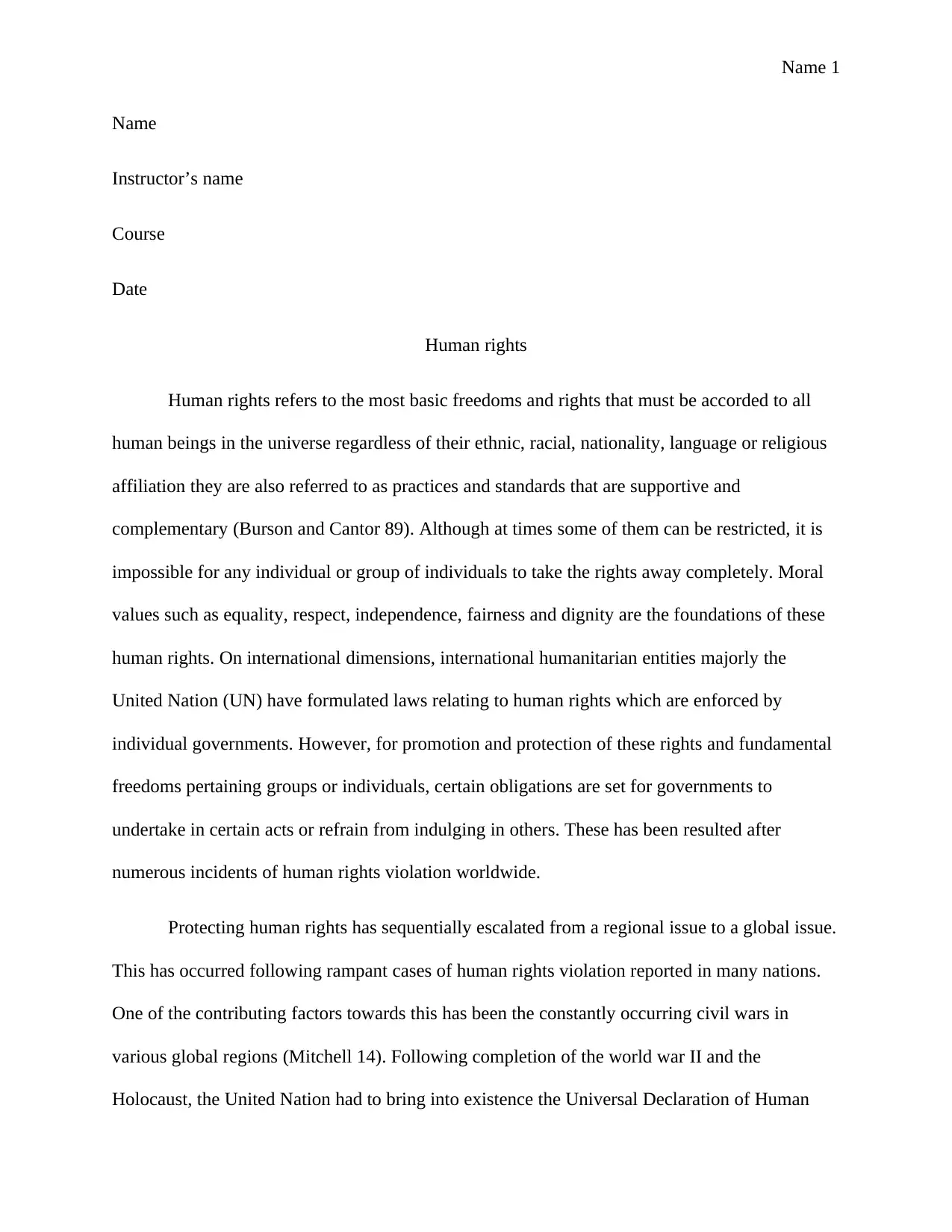
Name 1
Name
Instructor’s name
Course
Date
Human rights
Human rights refers to the most basic freedoms and rights that must be accorded to all
human beings in the universe regardless of their ethnic, racial, nationality, language or religious
affiliation they are also referred to as practices and standards that are supportive and
complementary (Burson and Cantor 89). Although at times some of them can be restricted, it is
impossible for any individual or group of individuals to take the rights away completely. Moral
values such as equality, respect, independence, fairness and dignity are the foundations of these
human rights. On international dimensions, international humanitarian entities majorly the
United Nation (UN) have formulated laws relating to human rights which are enforced by
individual governments. However, for promotion and protection of these rights and fundamental
freedoms pertaining groups or individuals, certain obligations are set for governments to
undertake in certain acts or refrain from indulging in others. These has been resulted after
numerous incidents of human rights violation worldwide.
Protecting human rights has sequentially escalated from a regional issue to a global issue.
This has occurred following rampant cases of human rights violation reported in many nations.
One of the contributing factors towards this has been the constantly occurring civil wars in
various global regions (Mitchell 14). Following completion of the world war II and the
Holocaust, the United Nation had to bring into existence the Universal Declaration of Human
Name
Instructor’s name
Course
Date
Human rights
Human rights refers to the most basic freedoms and rights that must be accorded to all
human beings in the universe regardless of their ethnic, racial, nationality, language or religious
affiliation they are also referred to as practices and standards that are supportive and
complementary (Burson and Cantor 89). Although at times some of them can be restricted, it is
impossible for any individual or group of individuals to take the rights away completely. Moral
values such as equality, respect, independence, fairness and dignity are the foundations of these
human rights. On international dimensions, international humanitarian entities majorly the
United Nation (UN) have formulated laws relating to human rights which are enforced by
individual governments. However, for promotion and protection of these rights and fundamental
freedoms pertaining groups or individuals, certain obligations are set for governments to
undertake in certain acts or refrain from indulging in others. These has been resulted after
numerous incidents of human rights violation worldwide.
Protecting human rights has sequentially escalated from a regional issue to a global issue.
This has occurred following rampant cases of human rights violation reported in many nations.
One of the contributing factors towards this has been the constantly occurring civil wars in
various global regions (Mitchell 14). Following completion of the world war II and the
Holocaust, the United Nation had to bring into existence the Universal Declaration of Human
Secure Best Marks with AI Grader
Need help grading? Try our AI Grader for instant feedback on your assignments.
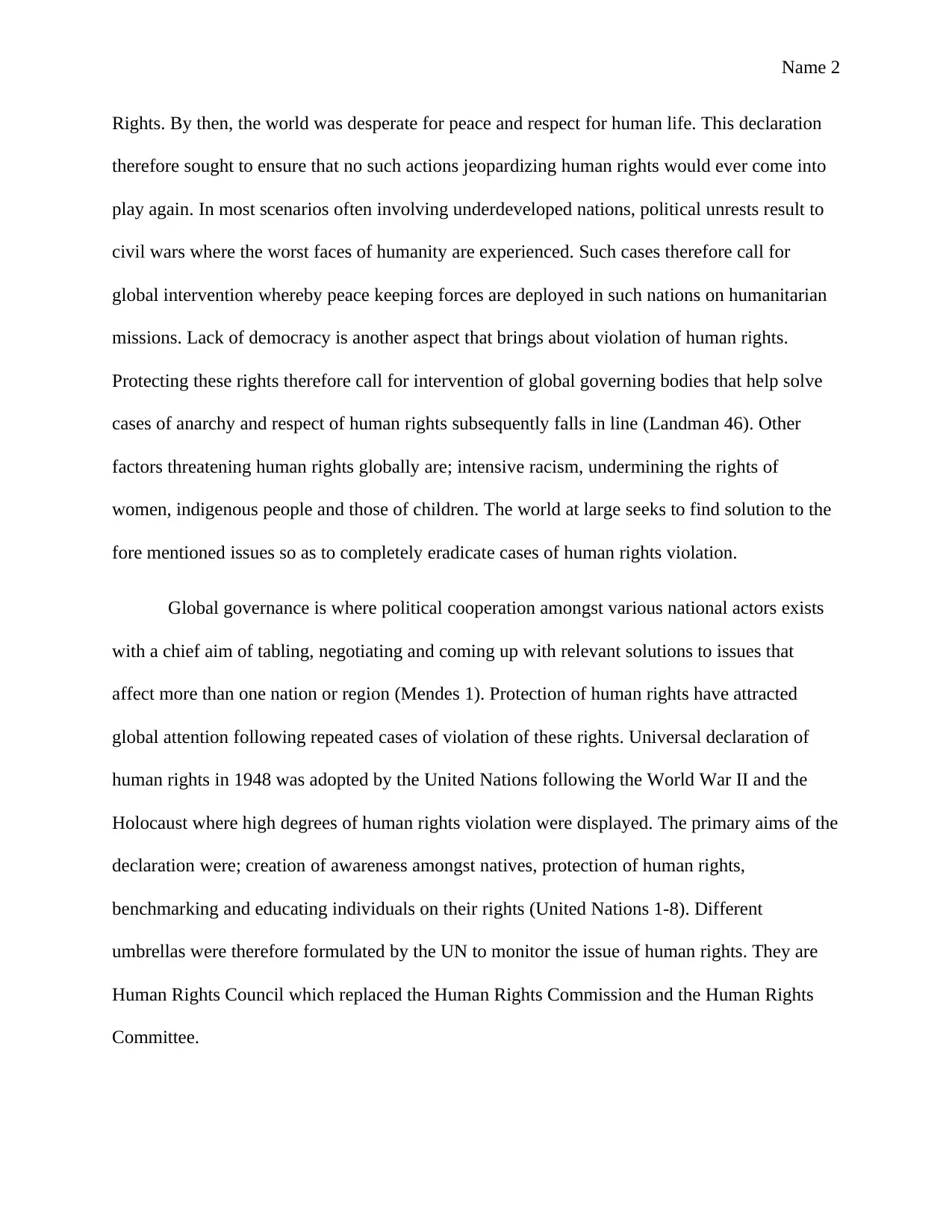
Name 2
Rights. By then, the world was desperate for peace and respect for human life. This declaration
therefore sought to ensure that no such actions jeopardizing human rights would ever come into
play again. In most scenarios often involving underdeveloped nations, political unrests result to
civil wars where the worst faces of humanity are experienced. Such cases therefore call for
global intervention whereby peace keeping forces are deployed in such nations on humanitarian
missions. Lack of democracy is another aspect that brings about violation of human rights.
Protecting these rights therefore call for intervention of global governing bodies that help solve
cases of anarchy and respect of human rights subsequently falls in line (Landman 46). Other
factors threatening human rights globally are; intensive racism, undermining the rights of
women, indigenous people and those of children. The world at large seeks to find solution to the
fore mentioned issues so as to completely eradicate cases of human rights violation.
Global governance is where political cooperation amongst various national actors exists
with a chief aim of tabling, negotiating and coming up with relevant solutions to issues that
affect more than one nation or region (Mendes 1). Protection of human rights have attracted
global attention following repeated cases of violation of these rights. Universal declaration of
human rights in 1948 was adopted by the United Nations following the World War II and the
Holocaust where high degrees of human rights violation were displayed. The primary aims of the
declaration were; creation of awareness amongst natives, protection of human rights,
benchmarking and educating individuals on their rights (United Nations 1-8). Different
umbrellas were therefore formulated by the UN to monitor the issue of human rights. They are
Human Rights Council which replaced the Human Rights Commission and the Human Rights
Committee.
Rights. By then, the world was desperate for peace and respect for human life. This declaration
therefore sought to ensure that no such actions jeopardizing human rights would ever come into
play again. In most scenarios often involving underdeveloped nations, political unrests result to
civil wars where the worst faces of humanity are experienced. Such cases therefore call for
global intervention whereby peace keeping forces are deployed in such nations on humanitarian
missions. Lack of democracy is another aspect that brings about violation of human rights.
Protecting these rights therefore call for intervention of global governing bodies that help solve
cases of anarchy and respect of human rights subsequently falls in line (Landman 46). Other
factors threatening human rights globally are; intensive racism, undermining the rights of
women, indigenous people and those of children. The world at large seeks to find solution to the
fore mentioned issues so as to completely eradicate cases of human rights violation.
Global governance is where political cooperation amongst various national actors exists
with a chief aim of tabling, negotiating and coming up with relevant solutions to issues that
affect more than one nation or region (Mendes 1). Protection of human rights have attracted
global attention following repeated cases of violation of these rights. Universal declaration of
human rights in 1948 was adopted by the United Nations following the World War II and the
Holocaust where high degrees of human rights violation were displayed. The primary aims of the
declaration were; creation of awareness amongst natives, protection of human rights,
benchmarking and educating individuals on their rights (United Nations 1-8). Different
umbrellas were therefore formulated by the UN to monitor the issue of human rights. They are
Human Rights Council which replaced the Human Rights Commission and the Human Rights
Committee.
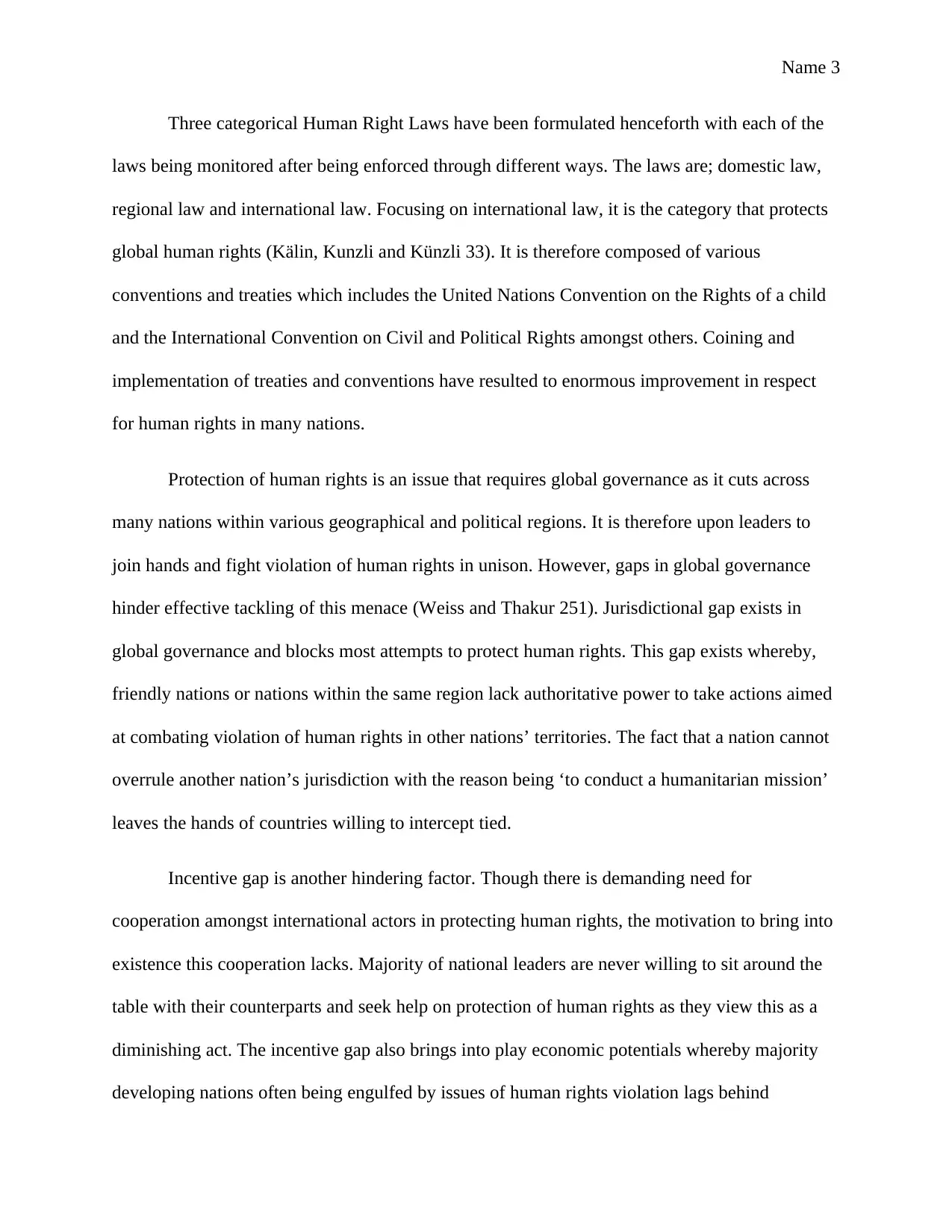
Name 3
Three categorical Human Right Laws have been formulated henceforth with each of the
laws being monitored after being enforced through different ways. The laws are; domestic law,
regional law and international law. Focusing on international law, it is the category that protects
global human rights (Kälin, Kunzli and Künzli 33). It is therefore composed of various
conventions and treaties which includes the United Nations Convention on the Rights of a child
and the International Convention on Civil and Political Rights amongst others. Coining and
implementation of treaties and conventions have resulted to enormous improvement in respect
for human rights in many nations.
Protection of human rights is an issue that requires global governance as it cuts across
many nations within various geographical and political regions. It is therefore upon leaders to
join hands and fight violation of human rights in unison. However, gaps in global governance
hinder effective tackling of this menace (Weiss and Thakur 251). Jurisdictional gap exists in
global governance and blocks most attempts to protect human rights. This gap exists whereby,
friendly nations or nations within the same region lack authoritative power to take actions aimed
at combating violation of human rights in other nations’ territories. The fact that a nation cannot
overrule another nation’s jurisdiction with the reason being ‘to conduct a humanitarian mission’
leaves the hands of countries willing to intercept tied.
Incentive gap is another hindering factor. Though there is demanding need for
cooperation amongst international actors in protecting human rights, the motivation to bring into
existence this cooperation lacks. Majority of national leaders are never willing to sit around the
table with their counterparts and seek help on protection of human rights as they view this as a
diminishing act. The incentive gap also brings into play economic potentials whereby majority
developing nations often being engulfed by issues of human rights violation lags behind
Three categorical Human Right Laws have been formulated henceforth with each of the
laws being monitored after being enforced through different ways. The laws are; domestic law,
regional law and international law. Focusing on international law, it is the category that protects
global human rights (Kälin, Kunzli and Künzli 33). It is therefore composed of various
conventions and treaties which includes the United Nations Convention on the Rights of a child
and the International Convention on Civil and Political Rights amongst others. Coining and
implementation of treaties and conventions have resulted to enormous improvement in respect
for human rights in many nations.
Protection of human rights is an issue that requires global governance as it cuts across
many nations within various geographical and political regions. It is therefore upon leaders to
join hands and fight violation of human rights in unison. However, gaps in global governance
hinder effective tackling of this menace (Weiss and Thakur 251). Jurisdictional gap exists in
global governance and blocks most attempts to protect human rights. This gap exists whereby,
friendly nations or nations within the same region lack authoritative power to take actions aimed
at combating violation of human rights in other nations’ territories. The fact that a nation cannot
overrule another nation’s jurisdiction with the reason being ‘to conduct a humanitarian mission’
leaves the hands of countries willing to intercept tied.
Incentive gap is another hindering factor. Though there is demanding need for
cooperation amongst international actors in protecting human rights, the motivation to bring into
existence this cooperation lacks. Majority of national leaders are never willing to sit around the
table with their counterparts and seek help on protection of human rights as they view this as a
diminishing act. The incentive gap also brings into play economic potentials whereby majority
developing nations often being engulfed by issues of human rights violation lags behind
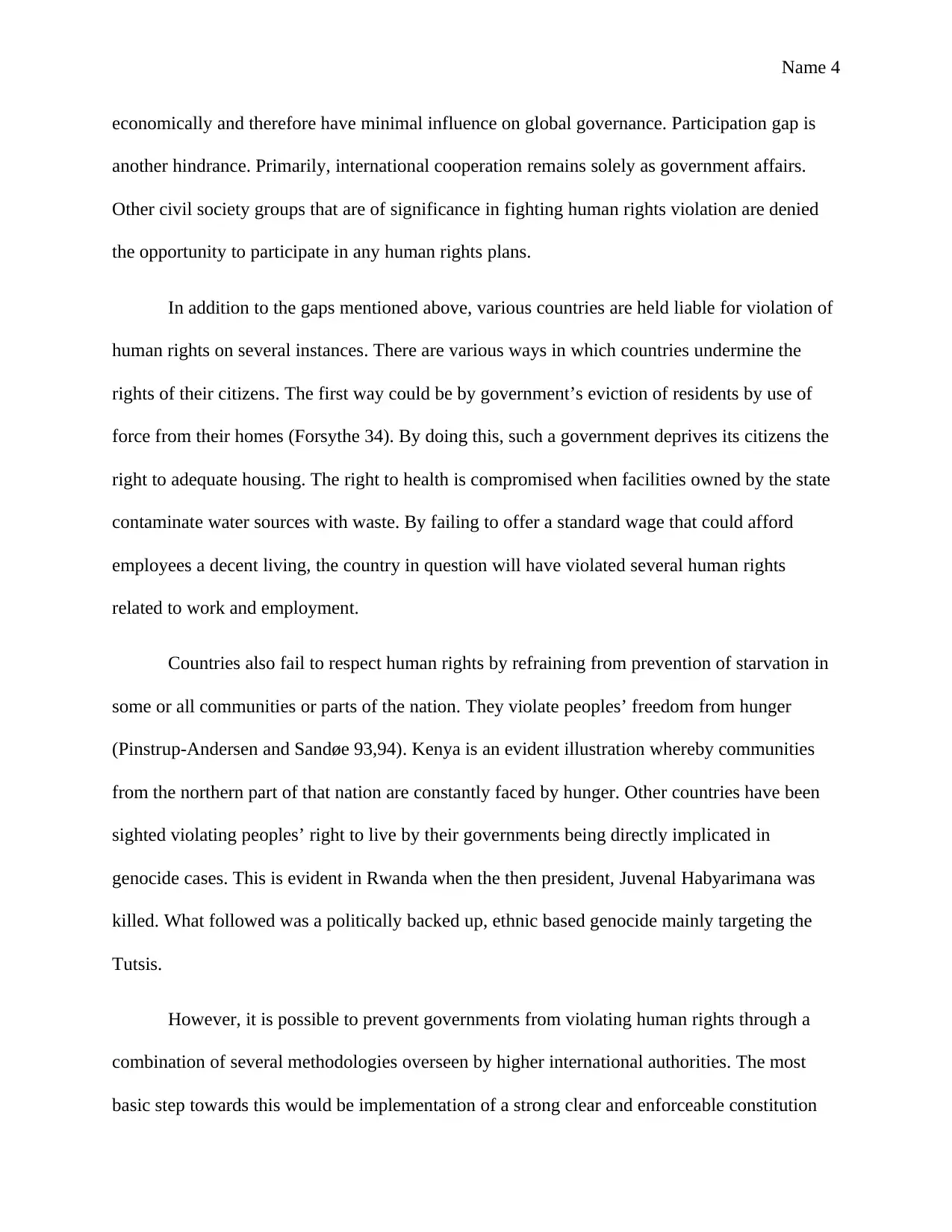
Name 4
economically and therefore have minimal influence on global governance. Participation gap is
another hindrance. Primarily, international cooperation remains solely as government affairs.
Other civil society groups that are of significance in fighting human rights violation are denied
the opportunity to participate in any human rights plans.
In addition to the gaps mentioned above, various countries are held liable for violation of
human rights on several instances. There are various ways in which countries undermine the
rights of their citizens. The first way could be by government’s eviction of residents by use of
force from their homes (Forsythe 34). By doing this, such a government deprives its citizens the
right to adequate housing. The right to health is compromised when facilities owned by the state
contaminate water sources with waste. By failing to offer a standard wage that could afford
employees a decent living, the country in question will have violated several human rights
related to work and employment.
Countries also fail to respect human rights by refraining from prevention of starvation in
some or all communities or parts of the nation. They violate peoples’ freedom from hunger
(Pinstrup-Andersen and Sandøe 93,94). Kenya is an evident illustration whereby communities
from the northern part of that nation are constantly faced by hunger. Other countries have been
sighted violating peoples’ right to live by their governments being directly implicated in
genocide cases. This is evident in Rwanda when the then president, Juvenal Habyarimana was
killed. What followed was a politically backed up, ethnic based genocide mainly targeting the
Tutsis.
However, it is possible to prevent governments from violating human rights through a
combination of several methodologies overseen by higher international authorities. The most
basic step towards this would be implementation of a strong clear and enforceable constitution
economically and therefore have minimal influence on global governance. Participation gap is
another hindrance. Primarily, international cooperation remains solely as government affairs.
Other civil society groups that are of significance in fighting human rights violation are denied
the opportunity to participate in any human rights plans.
In addition to the gaps mentioned above, various countries are held liable for violation of
human rights on several instances. There are various ways in which countries undermine the
rights of their citizens. The first way could be by government’s eviction of residents by use of
force from their homes (Forsythe 34). By doing this, such a government deprives its citizens the
right to adequate housing. The right to health is compromised when facilities owned by the state
contaminate water sources with waste. By failing to offer a standard wage that could afford
employees a decent living, the country in question will have violated several human rights
related to work and employment.
Countries also fail to respect human rights by refraining from prevention of starvation in
some or all communities or parts of the nation. They violate peoples’ freedom from hunger
(Pinstrup-Andersen and Sandøe 93,94). Kenya is an evident illustration whereby communities
from the northern part of that nation are constantly faced by hunger. Other countries have been
sighted violating peoples’ right to live by their governments being directly implicated in
genocide cases. This is evident in Rwanda when the then president, Juvenal Habyarimana was
killed. What followed was a politically backed up, ethnic based genocide mainly targeting the
Tutsis.
However, it is possible to prevent governments from violating human rights through a
combination of several methodologies overseen by higher international authorities. The most
basic step towards this would be implementation of a strong clear and enforceable constitution
Secure Best Marks with AI Grader
Need help grading? Try our AI Grader for instant feedback on your assignments.
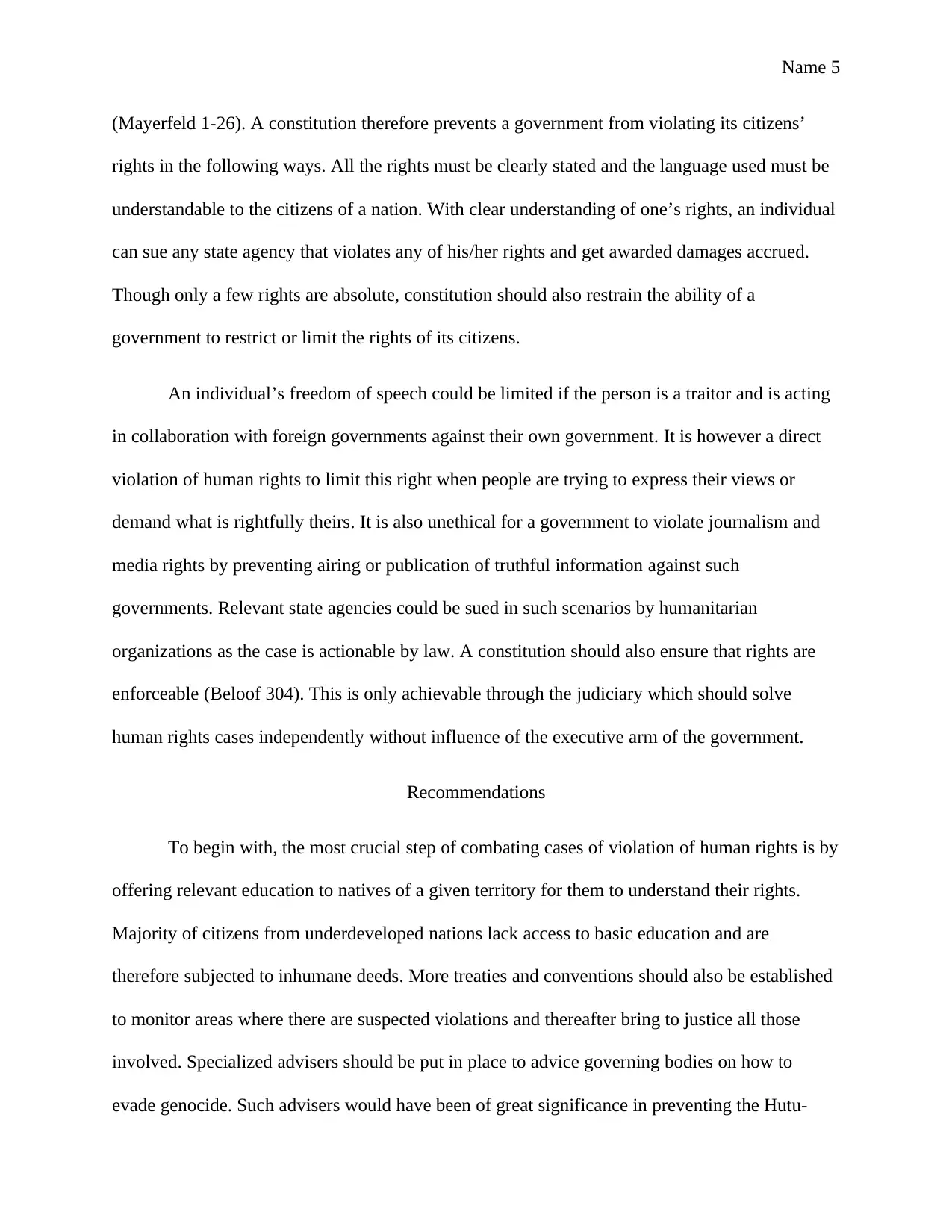
Name 5
(Mayerfeld 1-26). A constitution therefore prevents a government from violating its citizens’
rights in the following ways. All the rights must be clearly stated and the language used must be
understandable to the citizens of a nation. With clear understanding of one’s rights, an individual
can sue any state agency that violates any of his/her rights and get awarded damages accrued.
Though only a few rights are absolute, constitution should also restrain the ability of a
government to restrict or limit the rights of its citizens.
An individual’s freedom of speech could be limited if the person is a traitor and is acting
in collaboration with foreign governments against their own government. It is however a direct
violation of human rights to limit this right when people are trying to express their views or
demand what is rightfully theirs. It is also unethical for a government to violate journalism and
media rights by preventing airing or publication of truthful information against such
governments. Relevant state agencies could be sued in such scenarios by humanitarian
organizations as the case is actionable by law. A constitution should also ensure that rights are
enforceable (Beloof 304). This is only achievable through the judiciary which should solve
human rights cases independently without influence of the executive arm of the government.
Recommendations
To begin with, the most crucial step of combating cases of violation of human rights is by
offering relevant education to natives of a given territory for them to understand their rights.
Majority of citizens from underdeveloped nations lack access to basic education and are
therefore subjected to inhumane deeds. More treaties and conventions should also be established
to monitor areas where there are suspected violations and thereafter bring to justice all those
involved. Specialized advisers should be put in place to advice governing bodies on how to
evade genocide. Such advisers would have been of great significance in preventing the Hutu-
(Mayerfeld 1-26). A constitution therefore prevents a government from violating its citizens’
rights in the following ways. All the rights must be clearly stated and the language used must be
understandable to the citizens of a nation. With clear understanding of one’s rights, an individual
can sue any state agency that violates any of his/her rights and get awarded damages accrued.
Though only a few rights are absolute, constitution should also restrain the ability of a
government to restrict or limit the rights of its citizens.
An individual’s freedom of speech could be limited if the person is a traitor and is acting
in collaboration with foreign governments against their own government. It is however a direct
violation of human rights to limit this right when people are trying to express their views or
demand what is rightfully theirs. It is also unethical for a government to violate journalism and
media rights by preventing airing or publication of truthful information against such
governments. Relevant state agencies could be sued in such scenarios by humanitarian
organizations as the case is actionable by law. A constitution should also ensure that rights are
enforceable (Beloof 304). This is only achievable through the judiciary which should solve
human rights cases independently without influence of the executive arm of the government.
Recommendations
To begin with, the most crucial step of combating cases of violation of human rights is by
offering relevant education to natives of a given territory for them to understand their rights.
Majority of citizens from underdeveloped nations lack access to basic education and are
therefore subjected to inhumane deeds. More treaties and conventions should also be established
to monitor areas where there are suspected violations and thereafter bring to justice all those
involved. Specialized advisers should be put in place to advice governing bodies on how to
evade genocide. Such advisers would have been of great significance in preventing the Hutu-
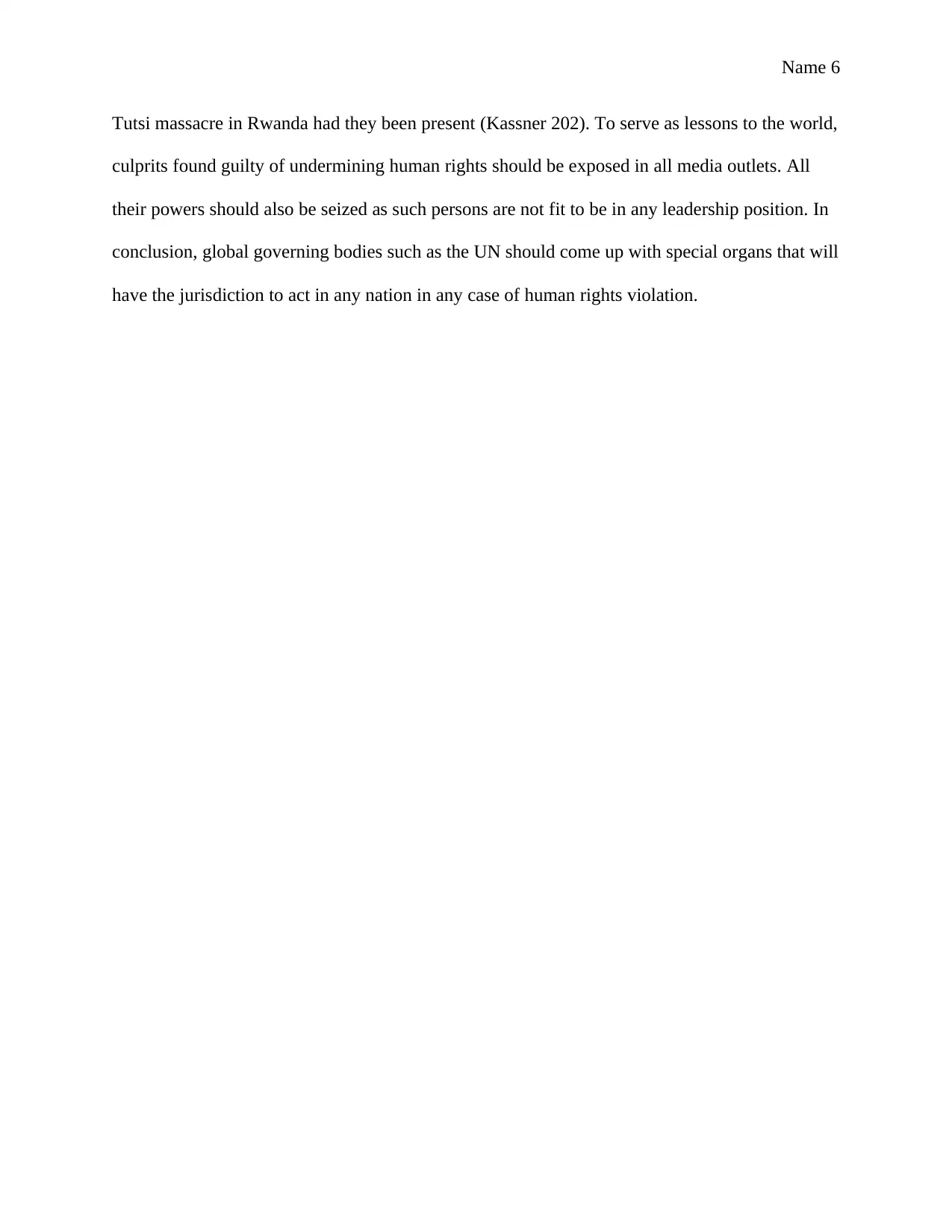
Name 6
Tutsi massacre in Rwanda had they been present (Kassner 202). To serve as lessons to the world,
culprits found guilty of undermining human rights should be exposed in all media outlets. All
their powers should also be seized as such persons are not fit to be in any leadership position. In
conclusion, global governing bodies such as the UN should come up with special organs that will
have the jurisdiction to act in any nation in any case of human rights violation.
Tutsi massacre in Rwanda had they been present (Kassner 202). To serve as lessons to the world,
culprits found guilty of undermining human rights should be exposed in all media outlets. All
their powers should also be seized as such persons are not fit to be in any leadership position. In
conclusion, global governing bodies such as the UN should come up with special organs that will
have the jurisdiction to act in any nation in any case of human rights violation.
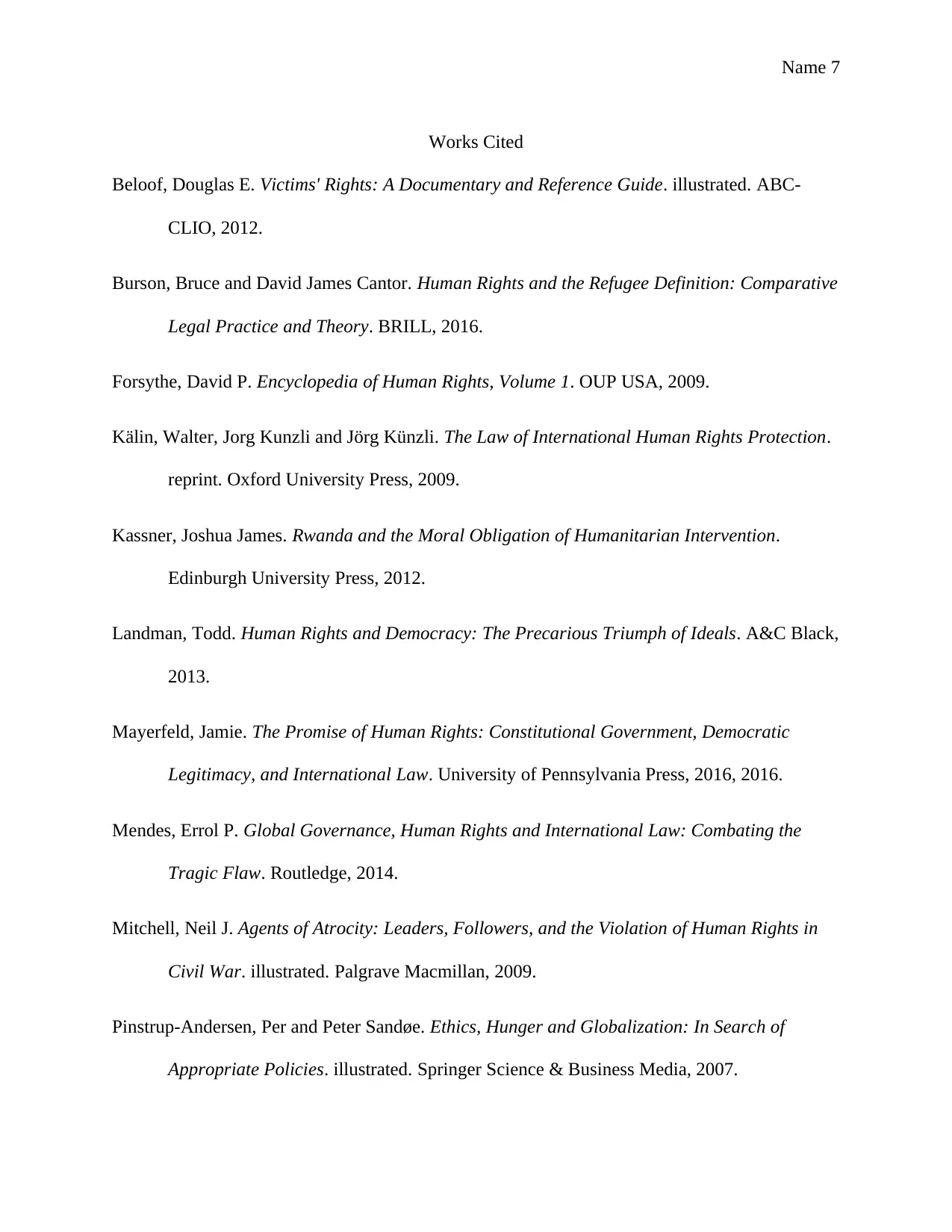
Name 7
Works Cited
Beloof, Douglas E. Victims' Rights: A Documentary and Reference Guide. illustrated. ABC-
CLIO, 2012.
Burson, Bruce and David James Cantor. Human Rights and the Refugee Definition: Comparative
Legal Practice and Theory. BRILL, 2016.
Forsythe, David P. Encyclopedia of Human Rights, Volume 1. OUP USA, 2009.
Kälin, Walter, Jorg Kunzli and Jörg Künzli. The Law of International Human Rights Protection.
reprint. Oxford University Press, 2009.
Kassner, Joshua James. Rwanda and the Moral Obligation of Humanitarian Intervention.
Edinburgh University Press, 2012.
Landman, Todd. Human Rights and Democracy: The Precarious Triumph of Ideals. A&C Black,
2013.
Mayerfeld, Jamie. The Promise of Human Rights: Constitutional Government, Democratic
Legitimacy, and International Law. University of Pennsylvania Press, 2016, 2016.
Mendes, Errol P. Global Governance, Human Rights and International Law: Combating the
Tragic Flaw. Routledge, 2014.
Mitchell, Neil J. Agents of Atrocity: Leaders, Followers, and the Violation of Human Rights in
Civil War. illustrated. Palgrave Macmillan, 2009.
Pinstrup-Andersen, Per and Peter Sandøe. Ethics, Hunger and Globalization: In Search of
Appropriate Policies. illustrated. Springer Science & Business Media, 2007.
Works Cited
Beloof, Douglas E. Victims' Rights: A Documentary and Reference Guide. illustrated. ABC-
CLIO, 2012.
Burson, Bruce and David James Cantor. Human Rights and the Refugee Definition: Comparative
Legal Practice and Theory. BRILL, 2016.
Forsythe, David P. Encyclopedia of Human Rights, Volume 1. OUP USA, 2009.
Kälin, Walter, Jorg Kunzli and Jörg Künzli. The Law of International Human Rights Protection.
reprint. Oxford University Press, 2009.
Kassner, Joshua James. Rwanda and the Moral Obligation of Humanitarian Intervention.
Edinburgh University Press, 2012.
Landman, Todd. Human Rights and Democracy: The Precarious Triumph of Ideals. A&C Black,
2013.
Mayerfeld, Jamie. The Promise of Human Rights: Constitutional Government, Democratic
Legitimacy, and International Law. University of Pennsylvania Press, 2016, 2016.
Mendes, Errol P. Global Governance, Human Rights and International Law: Combating the
Tragic Flaw. Routledge, 2014.
Mitchell, Neil J. Agents of Atrocity: Leaders, Followers, and the Violation of Human Rights in
Civil War. illustrated. Palgrave Macmillan, 2009.
Pinstrup-Andersen, Per and Peter Sandøe. Ethics, Hunger and Globalization: In Search of
Appropriate Policies. illustrated. Springer Science & Business Media, 2007.
Paraphrase This Document
Need a fresh take? Get an instant paraphrase of this document with our AI Paraphraser
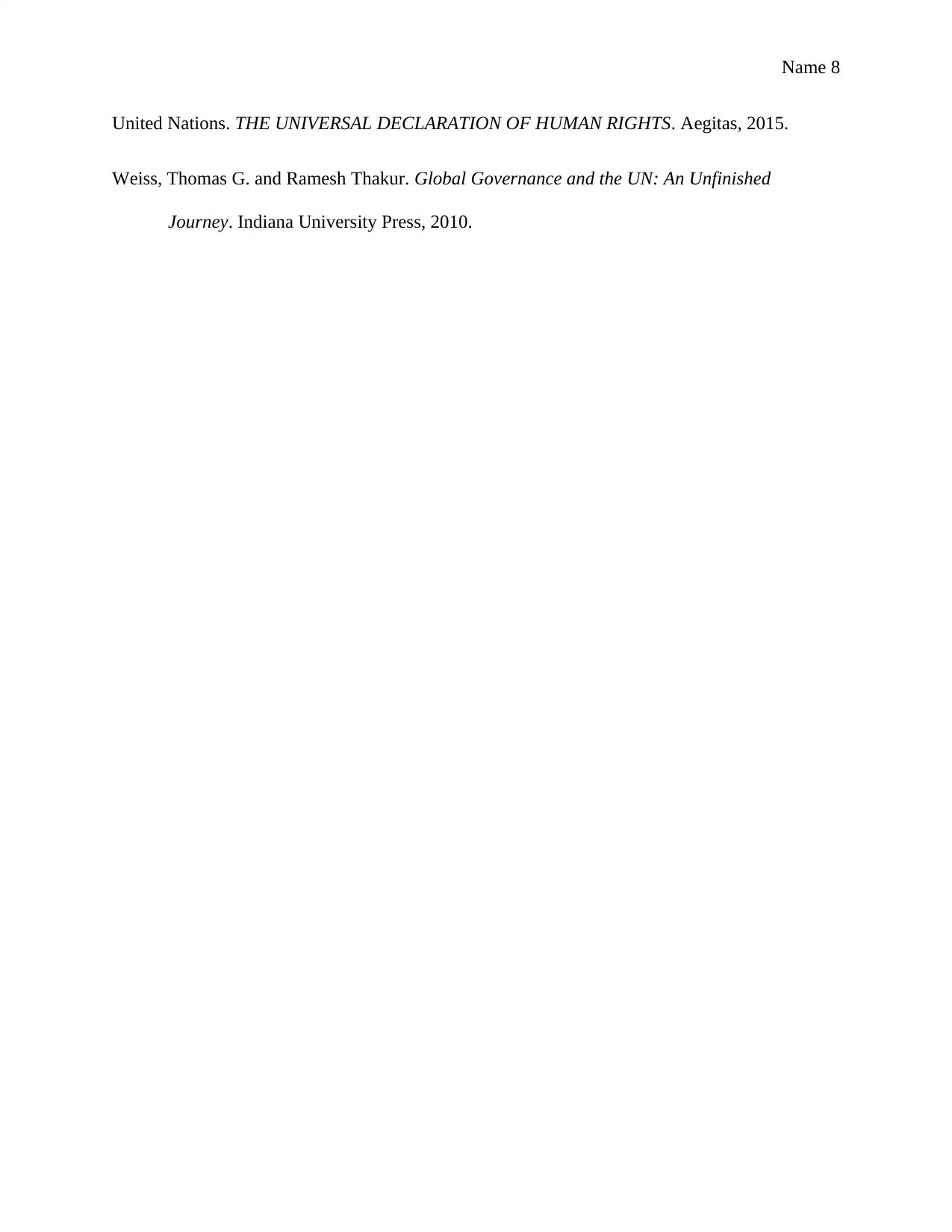
Name 8
United Nations. THE UNIVERSAL DECLARATION OF HUMAN RIGHTS. Aegitas, 2015.
Weiss, Thomas G. and Ramesh Thakur. Global Governance and the UN: An Unfinished
Journey. Indiana University Press, 2010.
United Nations. THE UNIVERSAL DECLARATION OF HUMAN RIGHTS. Aegitas, 2015.
Weiss, Thomas G. and Ramesh Thakur. Global Governance and the UN: An Unfinished
Journey. Indiana University Press, 2010.
1 out of 8
Related Documents
Your All-in-One AI-Powered Toolkit for Academic Success.
+13062052269
info@desklib.com
Available 24*7 on WhatsApp / Email
![[object Object]](/_next/static/media/star-bottom.7253800d.svg)
Unlock your academic potential
© 2024 | Zucol Services PVT LTD | All rights reserved.





